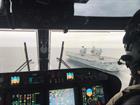COMMANDO WILDCAT DEBUTS ON HMS QUEEN ELIZABETH
The ‘flying eyes’ of the Royal Marines have touched down on Britain’s biggest warship – clearing them to join HMS Queen Elizabeth on front-line operations.
A nimble Commando Wildcat from 847 Naval Air Squadron landed repeatedly on the vast deck of the Portsmouth carrier in the Channel.
The multi-role helicopter with its three crew is typically found over land, performing tasks as varied as reconnaissance, close air support – directing air and artillery strikes on enemy forces – evacuating casualties, troop protection with its heavy machine-gun, and ferrying troops and equipment around.
But as the marines are the nation’s elite amphibious force, the Commando Helicopter Force Wildcats must be expected to operate seamlessly at sea (something the Army version of the Wildcat, also based at Yeovilton, cannot do).
Queen Elizabeth sailed from Portsmouth last week to begin the latest stage of her training in preparation for her maiden deployment leading a carrier task group next year.
Pilots and a crewman from the Yeovilton-based squadron joined the carrier to ensure they remained qualified for operating at sea – requiring 24 safe landings by day and night (the latter with the aid of night vision goggles – and to ensure they’re ready for immediate operations if called upon.
They’d already performed a number of training ‘sorties’ in at the state-of-the-art simulators at their home base before heading out over the Channel to join the future flagship.
While landing a Wildcat safely on HMS Queen Elizabeth with a flight deck the size of three football pitches is considerably easier than on a much-smaller frigate or destroyer, there are other considerations to bear in mind for the crew.
“The massive flight deck of the Queen Elizabeth gives us lots of space to manoeuvre the aircraft,” explained Petty Officer Aircrewman Arron Tobin. “But it can also get very busy with lots of activity and so proves excellent training.
“We have made considerable gains in our knowledge and experience of operating at sea and it has been great to see everyone, engineers and aircrew alike, working together to achieve the qualification.”
Qualified Helicopter Instructor Lieutenant Commander David Westley added: “It was hugely rewarding to be part of the first Commando Wildcat crew to conduct night vision deck landings on the Queen Elizabeth class.”
The squadron continues to train from its home in the South West to maintain its ability to deploy anywhere in the world at short notice.


